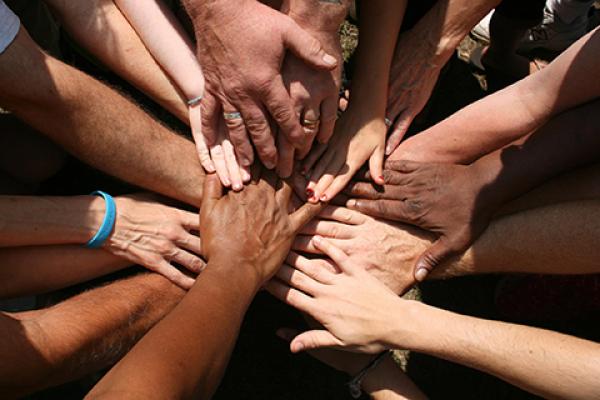On February 24, 1957, the KKK held a 150-person rally in Americus, Ga, drawing men and women from around the region. Following the rally, they assembled a 70-80 car motorcade and drove 10 miles down the highway to a Christian community called Koinonia Farm. They came to ask the community to move out of town, offering that the Klan would see to it that they received full value for their property and equipment. The community refused.
For years, the racial tension in the small Southwest Georgia town had been escalating. Koinonia Farm began in 1942, and lived in relative peace for many years. From the earliest days, the community's pacifist, equality of brother/sisterhood, and communal beliefs were challenged, but not as violently as they would be in the following decades. That violence began in 1950, when Koinonia members were ex-communicated from nearly all the churches in town.
The story of Koinonia Farm's involvement in the Civil Rights Movement is well-documented. The community's roadside market was blown up, fences were cut to let loose the pigs onto the highway, hundreds of trees were chopped down, and the community endured nightly drive-by shootings onto the property. Supporters from around the country came to stand in solidarity with Koinonia during this time. One such supporter was Dorothy Day, who was shot at and nearly killed during Holy Week 1957. Dr King refused to come to Americus, and called the city's sheriff the meanest man in the world. The bombings and shootings were accompanied by a KKK-mandated economic boycott. When a downtown store dared to do business with Koinonia, the storefront was blown up that very night.
The community responded by starting a mail-order business, selling hams, pecans, and baked goods to supporters around the country. The business slogan showed the community's creative zeal - "Help Us Ship the Nuts Out of Georgia!" The money from this business has largely supported the Koinonia community through the decades, as well as their many ministries. One well-known ministry that came out of their work with local neighbors is now known around the world as Habitat for Humanity. Another is Jubilee Partners, a community that has welcomed refugees since 1980.
Through the years, Koinonia has come to be known around the country as the pecan farm that sells chocolate, pecan pies, granola, and other goods. Clarence Jordan, a founding member of Koinonia, transliterated the New Testament from the Greek to South Georgia vernacular. His Cotton Patch Gospels and many sermons have shaped pastors in the pulpit, farmers on the tractor, and teachers in the classroom. Through the mail-order business, Koinonia has remained a household name and the Koinonia story has been passed on to new generations. Though the chocolate is good, the community's long-standing commitment to human rights is even sweeter. Though the pecans are nutritious, the community's commitment to sustainable agriculture is even healthier. Several years ago, the community transitioned their 100 acres of pecan orchards into Biological Production - a system of farming that is based on life and the interconnectedness of biology, not on chemicals.
Through their business today, the community partners with several fair-trade organizations around the world, including Canaan Fair Trade - a cooperative of over 1700 small farms in Palestine. They also support the work of several state-side organizations, including Ashbury Images - a print shop that works with youth in San Francisco, Humphreys Street Soaps that provides jobs and mentoring in Nashville, Tn, Café Campesino - an organic coffee roaster in Americus, Ga that works directly with coffee farmers around the globe, and Ekata Designs - a jewelry company in Memphis, Tn that provides jobs and training for refugee women.
Today the community's ministry focus is to "Feed the Hungry - Physically and Spiritually." Koinonia welcomes thousands of guests each year to share meals, housing, and life with the community. They offer a one-year service learning opportunity for individuals or families to come develop hands-on experience in community. They partner with El Refugio to offer bags of clothing to men awaiting deportation at the nearby Stewart Detention Center, a for-profit, private prison that houses undocumented men.
At the core of everything Koinonia does is a small group of people dedicated to living out the Gospels, no matter the political climate in the country or in the church. Koinonia is committed to creating a better world, where all God's children are safe, valued, protected, and included. Koinonia stands together with immigrants, refugees, women, homeless, the prisoner, the poor, those who follow other religions, and those who are differently-abled, not only because it's a value they aspire to uphold, but because Scripture compels all Christians to do so. The Gospels are filled with stories of Jesus creating life with a whole variety of people and carrying out the mission of caring for the lost, the down-trodden, and the forgotten. Jesus was a border-crossing, taboo-breaking refugee who sought to break down barriers by creating companionship.
These are scary times, where neighbor has been pitted against neighbor, even in the church. Our world faces the same hatred and bigotry that Jesus and his followers faced, that the early Koinonia members faced. Please know that Koinonia chooses to respond with that same zeal for love, for peace, for diversity, and for unity among all God's people.
Learn more about Koinonia's history, how you can schedule a visit, sign up for an internship, or donate to the community's ministries. And please don't forget to place your holiday order!


